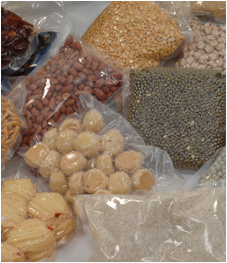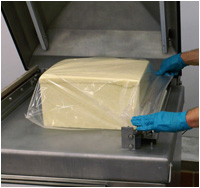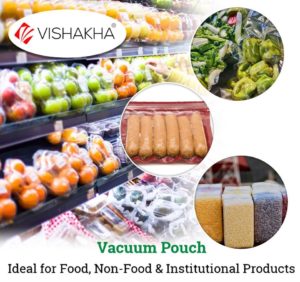How Vacuum Bags are manufactured?
Vacuum pouches are made with the help of equipments like vacuum pumps and generators. These equipments are applied to form external vacuum to provide strength to the bag when it is applied for packaging. This packaging source is made of safe and hygienic plastic ingredient; hence, it is found to be safe for packing food products. They are designed with polythene, nylon and other moisture resistant materials. Vacuum bags are applied for packaging requirements mostly in food and medical industries.


Lamination Benefits from Vacuum Bags
Vacuum packaging component is highly applied in food and medical industry for the high resistance quality it posses. Based on the packing requirement for different kinds of consumable materials, vacuum bags are produced with varying thickness and sizes. Some of the widely preferred types are 3, 5 and 7 layered vacuum bags. Apart from that vacuum packing material is also available as light barrier and heavy duty barrier vacuum pouches. They are preferred for the flexibility in sealing strength. In addition, this material is beneficial in the following ways such as,
- Water Proof and moisture resistant material.
- Made with Barrier film material therefore sustains atmospheric influence without causing much impact on the product that is being packed.

The lamination strength of the vacuum materials depends solely on the bagging ingredient applied by the manufacturer. The composition of raw materials has to be selected in such a way that they stay compatible to each other during the temperature curing process.
Raw Materials Applied in the Production of Vacuum Pouch Production
Vacuum bags are made of ingredients that have more strength to withstand vacuum technology and pressure; however, at the same time the materials should not go down from its typical resistance properties. Hence, manufacturers select materials that can withstand high pressure, temperature and vacuum procedure. Some of the important and compatible raw materials are,
- Plastic Films- Plastic films mixed with resin and the pouch material is produced using high vacuum pressure and the material obtained by this method is called perforated film.
- Nylon-Nylon is combined with plastic or polythene to from barrier films and this is further fed into the vacuum equipment to get the desired vacuum pouch shape.
- Polyurethane and co-polymer-These ingredients possess good flexibility and can sustain up to 650*F.
There are other raw materials that are also applied in vacuum bag manufacturing; however, manufacturers tend to check the compatibility of the materials

Competitive Manufacturing Methods Adopted in Vacuum Bag Manufacturing
Considering the varying industrial requisites for packaging, manufacturers accept custom designs in terms of offering expandable, reusable, and other types of vacuum bags. Customized vacuum bag designs are made with highly heat and moisture resistant materials wherein, quality of such customized bags stay highly reliable. However, innovations are introduced in vacuum bag production technology by increasing the productivity, efficiency in protection of the products and make sure of the performance of the materials.
Conclusion
Packaging industry face lot of changes in packaging technology and features with the advent of different types of packaging materials and vacuum pouch is one among the innovations.
